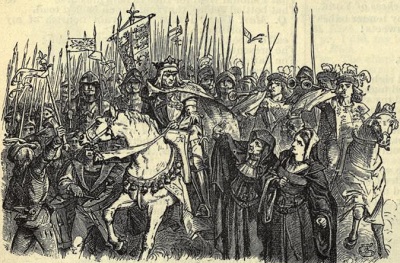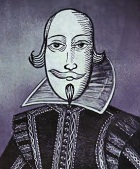| directory |
| home | contact |
|
|||||||||||||||
| search | |||||||||||||||
Shakespeare and HorsesIt is clear that the horse was one of Shakespeare's favorite animals. His appreciation of the grace, strength and loyalty of horses is evident in the care he took to name so many of the horses mentioned in the plays -- Barbary, Capilet, Dobbin, Surrey, Galathe, Curtal -- and in the intense feelings horses kindle in his characters. The following is a collection of Shakespearean quotations on horses, including the most famous of them all from Richard III: "A horse! a horse! my kingdom for a horse!"___ DAUPHIN. What a long night is this! I will not change my horse with any that treads but on four pasterns. Ca, ha! he bounds from the earth, as if his entrails were hairs; le cheval volant, the Pegasus, chez les narines de feu! When I bestride him, I soar, I am a hawk: he trots the air; the earth sings when he touches it; the basest horn of his hoof is more musical than the pipe of Hermes. ORLEANS. He's of the colour of the nutmeg. DAUPHIN. And of the heat of the ginger. It is a beast for Perseus: he is pure air and fire; and the dull elements of earth and water never appear in him, but only in Patient stillness while his rider mounts him: he is indeed a horse; and all other jades you may call beasts. CONSATBLE. Indeed, my lord, it is a most absolute and excellent horse. Henry V GROOM. I was a poor groom of thy stable, king, When thou wert king; who, travelling towards York, With much ado at length have gotten leave To look upon my sometimes royal master's face. O, how it yearn'd my heart when I beheld In London streets, that coronation-day, When Bolingbroke rode on roan Barbary, That horse that thou so often hast bestrid, That horse that I so carefully have dress'd! KING RICHARD II. Rode he on Barbary? Tell me, gentle friend, How went he under him? GROOM. So proudly as if he disdain'd the ground. KING RICHARD II. So proud that Bolingbroke was on his back! That jade hath eat bread from my royal hand; This hand hath made him proud with clapping him. Would he not stumble? would he not fall down, Since pride must have a fall, and break the neck Of that proud man that did usurp his back? Forgiveness, horse! why do I rail on thee, Since thou, created to be awed by man, Wast born to bear? I was not made a horse; And yet I bear a burthen like an ass, Spurr'd, gall'd and tired by jouncing Bolingbroke. Richard II My lord, Sir John Umfrevile turn'd me back With joyful tidings; and, being better horsed, Out-rode me. After him came spurring hard A gentleman, almost forspent with speed, That stopp'd by me to breathe his bloodied horse. He ask'd the way to Chester; and of him I did demand what news from Shrewsbury: He told me that rebellion had bad luck And that young Harry Percy's spur was cold. With that, he gave his able horse the head, And bending forward struck his armed heels Against the panting sides of his poor jade Up to the rowel-head, and starting so He seem'd in running to devour the way. 2 Henry IV Let him let the matter slip, and I'll give him my horse, grey Capilet. Twelfth Night GOBBO. Her name is Margery, indeed: I'll be sworn, if thou be Launcelot, thou art mine own flesh and blood. Lord worshipped might he be! what a beard hast thou got! thou hast got more hair on thy chin than Dobbin my fill-horse has on his tail. LAUNCELOT. It should seem, then, that Dobbin's tail grows backward: I am sure he had more hair of his tail than I have of my face when I last saw him. Twelfth Night Now here he fights on Galathe his horse. Troilus and Cressida The strong-neck'd steed, being tied unto a tree, Breaketh his rein, and to her straight goes he. Imperiously he leaps, he neighs, he bounds, And now his woven girths he breaks asunder; The bearing earth with his hard hoof he wounds, Whose hollow womb resounds like heaven's thunder; The iron bit he crushes 'tween his teeth, Controlling what he was controlled with. Venus and Adonis (274-81) Look, when a painter would surpass the life, In limning out a well-proportion'd steed, His art with nature's workmanship at strife, As if the dead the living should exceed; So did this horse excel a common one, In shape, in courage, colour, pace and bone. Round-hoof'd, short-jointed, fetlocks shag and long, Broad breast, full eye, small head, and nostril wide, High crest, short ears, straight legs and passing strong, Thin mane, thick tail, broad buttock, tender hide: Look, what a horse should have he did not lack, Save a proud rider on so proud a back. Venus and Adonis (289-301) I had rather have my horse to my mistress. Henry V He doth nothing but talk of his horse. The Merchant of Venice I'd give bay Curtal and his furniture, My mouth no more were broken than these boys', And writ as little beard. All's Well That Ends Well Shall pack-horses And hollow pamper'd jades of Asia, Which cannot go but thirty mile a-day, Compare with Caesars, and with Cannibals, And Trojan Greeks? 2 Henry IV Anger is like A full-hot horse, who being allow'd his way, Self-mettle tires him. Henry VIII May it please your honour, Lord Lucius, Out of his free love, hath presented to you Four milk-white horses, trapp'd in silver. Timon of Athens O Charmian, Where think'st thou he is now? Stands he, or sits he? Or does he walk? or is he on his horse? O happy horse, to bear the weight of Antony! Do bravely, horse! for wot'st thou whom thou movest? The demi-Atlas of this earth, the arm And burgonet of men. Antony and Cleopatra He's mad that trusts in the tameness of a wolf, a horse's health, a boy's love, or a whore's oath. King Lear Ever note, Lucilius, When love begins to sicken and decay, It useth an enforced ceremony. There are no tricks in plain and simple faith; But hollow men, like horses hot at hand, Make gallant show and promise of their mettle; But when they should endure the bloody spur, They fall their crests, and, like deceitful jades, Sink in the trial. Julius Caesar My purpose is, indeed, a horse of that colour. Twelfth Night Down, down I come; Like glistering Phaethon, Wanting the manage of unruly jades. Richard II RICHARD III. A horse! a horse! my kingdom for a horse! CATE. Withdraw, my lord; I'll help you to a horse. RICHARD III. Slave! I have set my life upon a cast, And I will stand the hazard of the die. I think there be six Richmonds in the field; Five have I slain to-day, instead of him. A horse! a horse! my kingdom for a horse! Richard III * Surrey is the name of Richard III's horse. In 5.3, Richard orders Ratcliff to "Saddle white Surrey for the field to-morrow." Poor Surrey is killed on the battlefield in the next scene, prompting Richard's most famous cry, "A horse! a horse! my kingdom for a horse!" How to cite this article: _______ |

More to Explore
|
©1999-2021 Shakespeare Online. All Rights Reserved.
 The Elizabethans were fond of animals performing tricks, much as we are today, and references to legendary feats performed by animals are common in the literature of the time. A breathtaking bay gelding named Morocco, owned by a Scotsman named Banks, captured the attention of London with his astounding ability to answer questions, dance to music, count, climb buildings and walk backwards. Shakespeare himself alludes to Morocco in
The Elizabethans were fond of animals performing tricks, much as we are today, and references to legendary feats performed by animals are common in the literature of the time. A breathtaking bay gelding named Morocco, owned by a Scotsman named Banks, captured the attention of London with his astounding ability to answer questions, dance to music, count, climb buildings and walk backwards. Shakespeare himself alludes to Morocco in  Ale (beer made with a top fermenting yeast) was the drink of choice in Shakespeare's day. Everyone from the poorest farmer to the Queen herself drank the brew made from malt, and a mini brewery was an essential part of every household. Shakespeare's
Ale (beer made with a top fermenting yeast) was the drink of choice in Shakespeare's day. Everyone from the poorest farmer to the Queen herself drank the brew made from malt, and a mini brewery was an essential part of every household. Shakespeare's